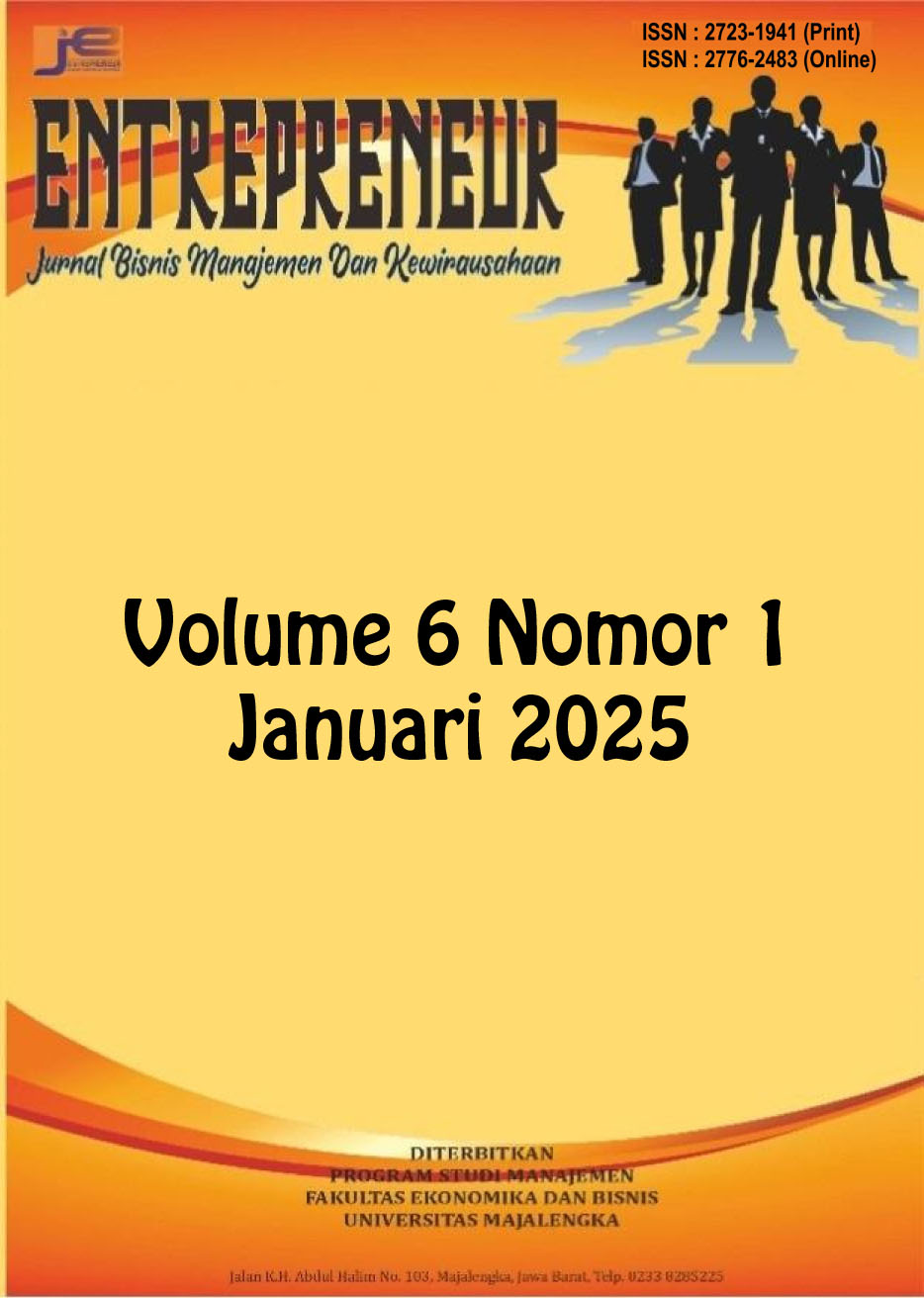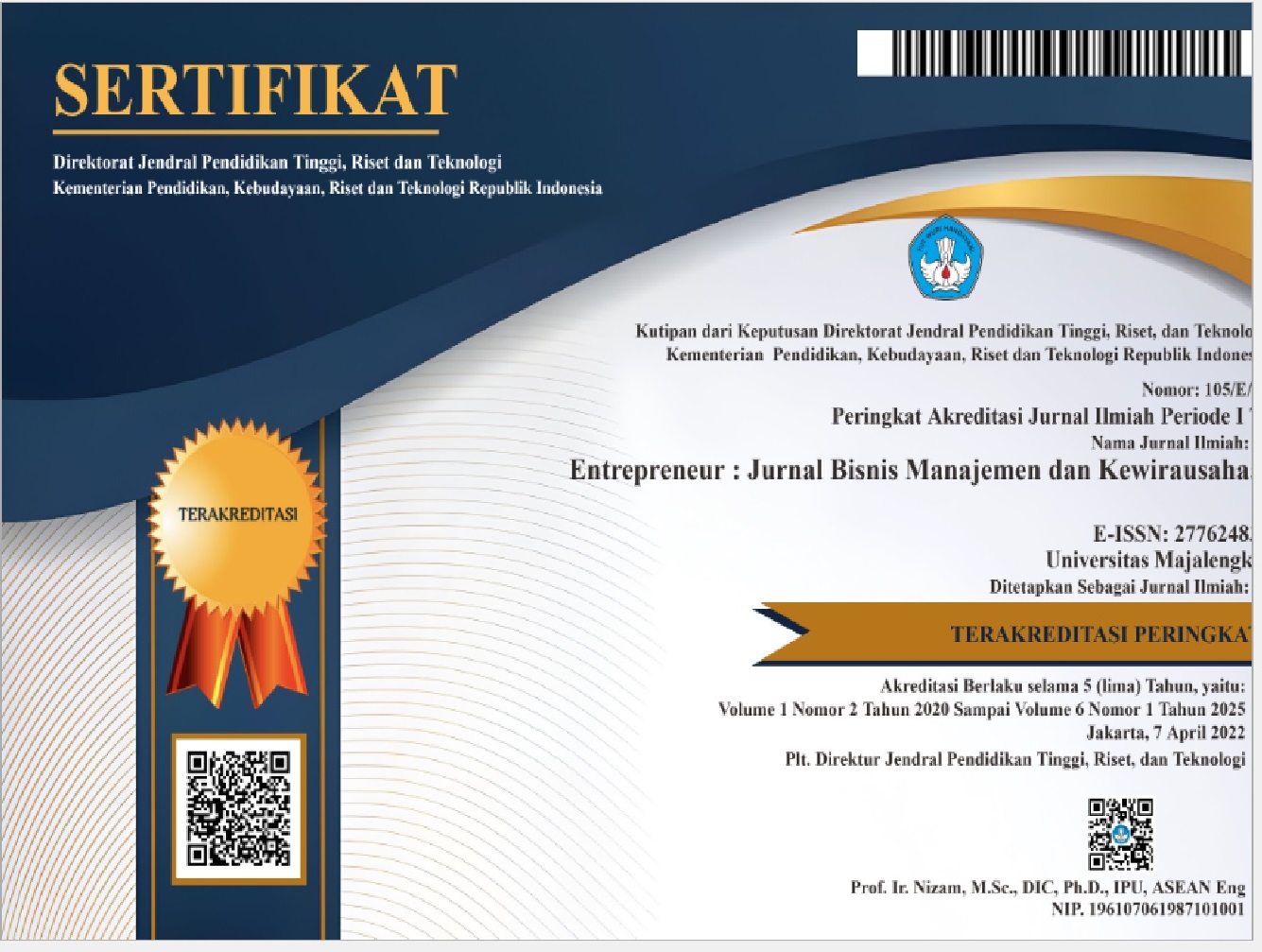Eksplorasi Pandangan dan Minat Generasi Y dan Z Terhadap Transformasi Koperasi
DOI:
https://doi.org/10.31949/entrepreneur.v6i1.12961Abstract
Cooperatives have long been one of the main pillars of Indonesia's economy; however, interest among younger generations in this business model has declined in the digital era. The transformation of cooperatives through innovation and digitalization presents both challenges and opportunities in attracting the engagement of Generation Y and Z. This study aims to explore the factors influencing the perceptions and interest of these generations in cooperatives, focusing on digital innovation, social sustainability, and technological access. Employing a qualitative approach with a phenomenological design, this research involves semi-structured interviews with 15 participants from Generation Y and Z who have experience or interest in cooperatives. Thematic analysis is used to identify emerging patterns. The findings reveal that although Generation Y and Z show interest in cooperatives that embrace sustainability and digitalization, barriers such as limited understanding, negative experiences, and a lack of information about cooperatives persist. This study emphasizes the importance of innovation in cooperative products and services, as well as the need to enhance cooperative literacy and accessibility for younger generations. Therefore, cooperatives must adapt by leveraging digital technology and strengthening sustainability-based promotional strategies to remain relevant and appealing to Generation Y and Z.
Keywords:
Digitalisasi; Generasi Y; Generasi X; Inovasi; Koperasi.Downloads
References
Albert, S., & Whetten, D. A. (1985). Organizational identity. Research in Organizational Behavior, 7, 263–295.
Armillei, R., Wilson, B., & Reeves, J. (2024). Embedding a Circular Economy through Local Government in Gippsland: A Case Study, Utilizing Smart Specialization Methodology.
Ajzen, I. (1991). The theory of planned behavior. Organizational Behavior and Human Decision Processes, 50(2), 179–211. https://doi.org/10.1016/0749-5978(91)90020-T
Belz, F. M., & Peattie, K. (2012). Sustainability marketing: A global perspective. Wiley.
Broyde, Z. (2024). Ecoeuroregional Model Answering Common Challenges of Green Deal, 3 Sea Initiatives, and EU Strategy for Danube Region.
Čamo, L., & Miraščija, N. D. (2024). From Like to Millennial Diplomacy - EU Strategy Campaigns in Engaging Young Europeans.
Elkington, J. (1997). Cannibals with forks: The triple bottom line of 21st-century business. Capstone.
Huang, X., & Chiu, S. (2023). Generation Z and the future of social entrepreneurship: A case study. Journal of Business Ethics, 145(2), 321–337.
Ikeata, A. (2024). Improving Shopping Experience in Apparel Setting in Turku.
International Cooperative Alliance. (1995). The cooperative identity, values & principles. International Cooperative Alliance.
Koehler, L., Jones, C., & Farias, S. (2023). The rise of sustainability in cooperatives: What Gen Z expects. Sustainability Research, 11(4), 572–584.
Manwaring, M., Clark, S., & Summers, A. (2022). Digital transformation in cooperatives: A global perspective. Journal of Co-operative Studies, 55(3), 144–159.
Mannheim, K. (1952). The problem of generations. Psychosociological Essays. Routledge.
Putnam, R. D. (2000). Bowling alone: The collapse and revival of American community. Simon & Schuster.
Rogers, E. M. (2003). Diffusion of innovations (5th ed.). Free Press.
Schiffman, L. G., & Kanuk, L. L. (2010). Consumer behavior (10th ed.). Pearson Prentice Hall.
Smith, J. (2021). The youth perspective: Exploring Generation Z’s views on cooperatives in the digital age. Journal of Social Innovation, 23(1), 45–58.
Smith, L., & Johnson, M. (2021). Digital disruption and cooperatives: The rise of Gen Z and the challenges faced by traditional models. Cooperative Economics Review, 30(2), 120–135.
Zeithaml, V. A. (1988). Consumer perceptions of price, quality, and value: A means-end model and synthesis of evidence. Journal of Marketing, 52(3), 2–22.

Published
How to Cite
Issue
Section
License
Copyright (c) 2025 Dienni Ruhjatini Sholihah, Dea Delia Lestari, Risty Rahma Dafina

This work is licensed under a Creative Commons Attribution-ShareAlike 4.0 International License.
COPYRIGHT NOTICE
An author who publishes in the Entrepreneur: Jurnal Bisnis Manajemen dan Kewirausahaan agrees to the following terms:
1. Author retains the copyright and grants the journal the right of first publication of the work simultaneously licensed under the Creative Commons Attribution-ShareAlike 4.0 License that allows others to share the work with an acknowledgment of the work's authorship and initial publication in this journal
2. The author is able to enter into separate, additional contractual arrangements for the non-exclusive distribution of the journal's published version of the work (e.g., post it to an institutional repository or publish it in a book) with the acknowledgment of its initial publication in this journal.
3. The author is permitted and encouraged to post his/her work online (e.g., in institutional repositories or on their website) prior to and during the submission process, as it can lead to productive exchanges, as well as earlier and greater citation of the published work







